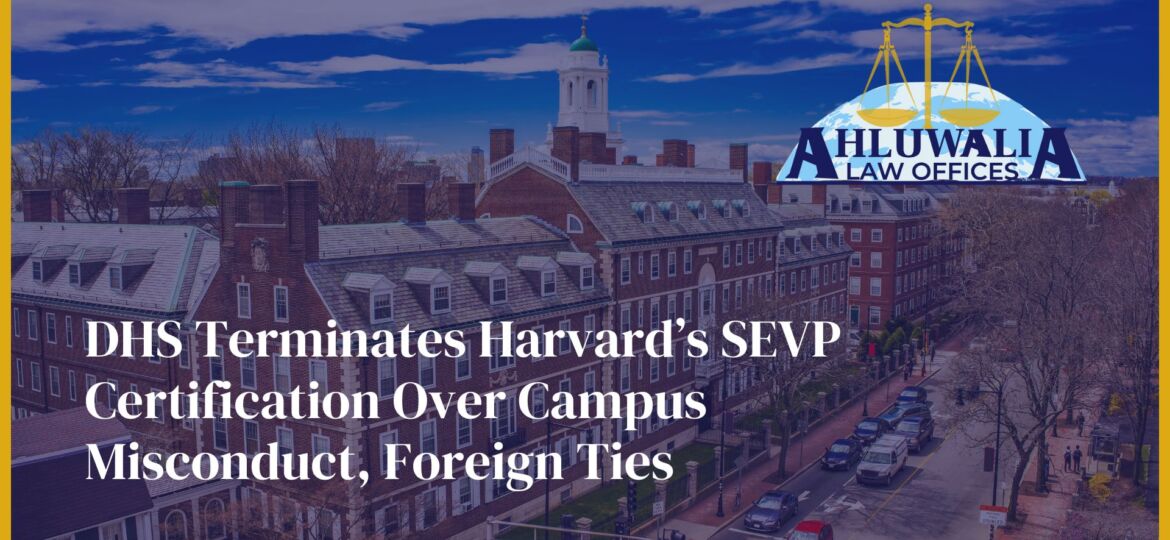
In a decisive and unprecedented move, the U.S. Department of Homeland Security (DHS) has revoked Harvard University’s Student and Exchange Visitor Program (SEVP) certification, effectively disqualifying the institution from enrolling new international students and jeopardizing the legal immigration status of those currently enrolled.
This development, officially announced by DHS Secretary Kristi Noem, comes in response to the university’s failure to address serious allegations involving campus safety, antisemitism, and foreign government influence, particularly from the Chinese Communist Party (CCP).
What Does the Termination Mean for International Students?
Foreign students currently attending Harvard on F-1 or J-1 visas must now seek immediate transfer to another SEVP-certified institution to maintain lawful status. If they fail to do so, they risk falling out of status, which could lead to immigration enforcement or removal proceedings.
Students impacted by this revocation should:
- Initiate the SEVIS transfer process promptly to an approved institution.
- Consult an immigration attorney to evaluate options for maintaining or changing status.
- Monitor communications from DHS and USCIS for procedural updates.
DHS Findings Leading to the Termination
The termination follows Harvard’s refusal to comply with a lawful request by DHS to provide records concerning criminal activity and misconduct by foreign students on campus. In April 2025, DHS had already terminated $2.7 million in federal grants to Harvard after initial findings. The university ignored follow-up communications from the DHS Office of General Counsel.
Key points cited in the DHS action include:
- Widespread antisemitic harassment and physical intimidation of Jewish students on campus, with little to no administrative intervention.
- Continued support and funding for pro-Hamas student organizations post-October 7 attacks.
- An increase in reported hate crimes, aggravated assaults, and robberies on campus between 2022 and 2023.
- Harvard’s collaboration with the CCP, including training members of the Xinjiang Production and Construction Corps (XPCC), a paramilitary group sanctioned for its role in the Uyghur genocide.
- Research partnerships funded through agents of foreign adversarial governments including Iran and China, in violation of national security protocols.
Broader Implications for Academic Institutions
This action sends a clear message: SEVP participation is a privilege, not a right. U.S. colleges and universities are expected to maintain not only academic standards but also uphold American values of safety, nondiscrimination, and compliance with federal law.
As stated by Secretary Noem, “Let this serve as a warning to all universities and academic institutions across the country.” Institutions found enabling or ignoring foreign influence, campus violence, or antisemitism may face loss of federal funds, program participation, or even criminal liability.
Legal Guidance for Foreign Students at Risk
If you are a current international student at Harvard University or any other institution facing similar scrutiny, Ahluwalia Law Offices urges you to act swiftly:
- Schedule a consultation to evaluate SEVIS transfer options.
- Understand how this development may impact Optional Practical Training (OPT) or CPT participation.
- Explore alternative visa pathways, including Change of Status (COS) and Adjustment of Status where applicable.
Ahluwalia Law Offices, PC is a Texas-based firm serving clients across the U.S. We specialize in employment-based immigration, student visa transitions, family-based immigration, and complex immigration litigation. We stand ready to assist individuals impacted by this SEVP policy shift with clarity, speed, and discretion.

